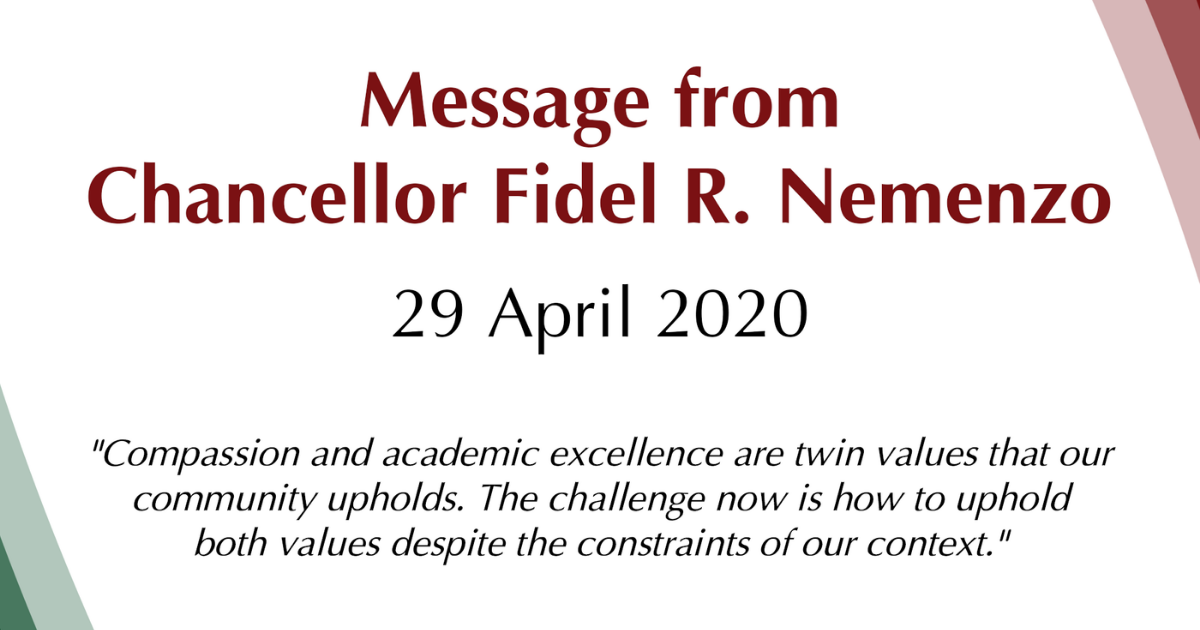Dear Members of the UP Diliman Community,
The novel coronavirus has given me an unusual welcome at the start of my term as Chancellor. Within a week, I had to form the UPD COVID-19 Task Force, composed of the Chancellor, Vice Chancellors, University Health Service personnel, students, staff and faculty from the different disciplines to plan and carry out our university’s community response to the pandemic.
The Task Force has been monitoring the COVID-19 situation in Diliman, coordinating with the LGU (local government unit) and barangay health officials, attending to the needs of residents, students and other personnel stranded in the campus, and issuing regular information bulletins through the UP Diliman Information Office.
I would like to report that we have transformed many of our buildings into COVID-19 facilities. Among these are the NISMED Hostel, which provides accommodation for Quezon City health frontliners; the Asian Institute of Tourism building, which serves as a testing center for Quezon City District 6 residents; and the Palma Hall, which has now been equipped as our University Health Service quarantine facility for the UP community. We hope that we will not have to use more than a few rooms of Palma Hall, but we need to be ready in case the situation escalates in the UP Diliman campus, which is surrounded by some of the city’s COVID-19 hotspots. These are just a few of the several COVID-19 response initiatives of UP Diliman. I will write more about these initiatives in a separate letter.
We have entered the seventh week of the Luzon-wide enhanced community quarantine. It has also been this long since we suspended online classes and work on campus. During this period, the University, at both the Diliman and System levels, embarked on a process to determine how the semester would proceed given the uncertain situation. Student, faculty and staff surveys were conducted. Memos have been issued to explain UP’s emerging guidelines and last week, the Office of the President released the implementing guidelines of the Board of Regents (BOR)-approved UP System Policy on the Second Semester AY 2019-2020 in the time of COVID-19.
I understand the anxiety and confusion among our students and faculty that this whole protracted process has created.
This is the last thing that we want to happen at a time when everyone is already under great stress. All I can say is that policymaking in the time of a pandemic is a novel process for the university.
While we have tried to consider perspectives, it is far from perfect. Still, we in the administration are learning from this process and will strive to do better.
I wish to address an issue that developed in the debates on how we should continue or close the semester. In some of the statements and exchanges in social media, I noticed the emergence of a split between compassion and academic excellence. This is a false dichotomy and one that we should not fall for.
Compassion and academic excellence are twin values that our community upholds. The challenge now is how to uphold both values despite the constraints of our context.
Our duty as a university is to provide our students with quality education. However, the discharge of this duty during the pandemic must be tempered with compassion, solidarity, and understanding, especially because, in this situation, our traditional tools and platforms for education do not work. The grading scale we used before the pandemic cannot properly measure the performance of students in a time of upheaval and disruption. Grades lose their meaning during an existential crisis. This is why the UP Diliman Executive Committee has requested the BOR to allow faculty to give a grade of “P” to students this semester.
We have to begin developing strong bridging programs to help transition our students into the coming school terms, even as we await how the pandemic situation unfolds. The crisis has compelled us to explore non-traditional modes and platforms of teaching and learning while recognizing the diverse curricular requirements of our students, the uneven access of faculty and students to technology, and the differences in personal circumstances within which people find themselves. In short, a strict single approach to concluding the academic year may not be possible.
Having said this, the BOR has set the University policy regarding the closure of the current semester and the academic year. This is our policy context.
I am enjoining our faculty in the various departments and colleges to re-imagine our ways of teaching and grading, exploring all the possible spaces provided by the policy that would enable you to carry out the most compassionate and feasible solution in consideration of the needs and welfare of our students in these precarious times.
Let us demonstrate that both compassion and academic excellence are mutually reinforcing values that will help us survive this crisis and face the challenges of the post-COVID-19 world with honor, integrity and solidarity.
Fidel R. Nemenzo
Chancellor, University of the Philippines Diliman
29 April 2020
This letter was originally posted in the website of the University of the Philippines Diliman. The graphic header was adopted and cropped from the image posted in the official Facebook page of the UP Diliman. To learn more about the university policies, memos, and responses to Covid-19, visit the KapitDiliman portal — Information Office, UP Asian Center
The Asian Center offers M.A. degrees in Asian Studies with four fields of specialization: Northeast Asia, Southeast Asia, South Asia, and West Asia. The Center also has an M.A. program in Philippine Studies that allows students to major in Philippine society and culture, Philippine foreign relations, or Philippine development studies. The Center offers a Ph.D. program in Philippine Studies in conjunction with the College of Arts and Letters and the College of Social Sciences and Philosophy. For an overview of these graduate programs, click here. The Asian Center also publishes Asian Studies: Journal of Critical Perspectives on Asia.






